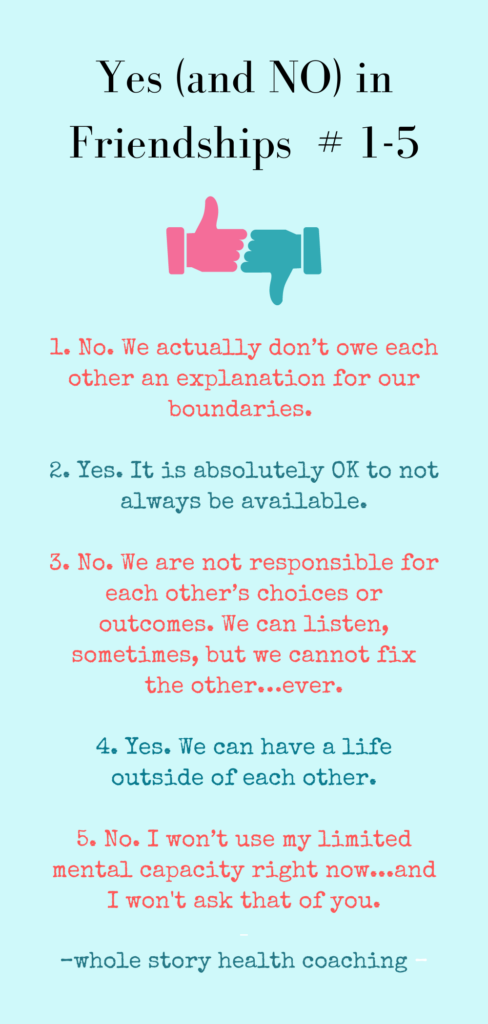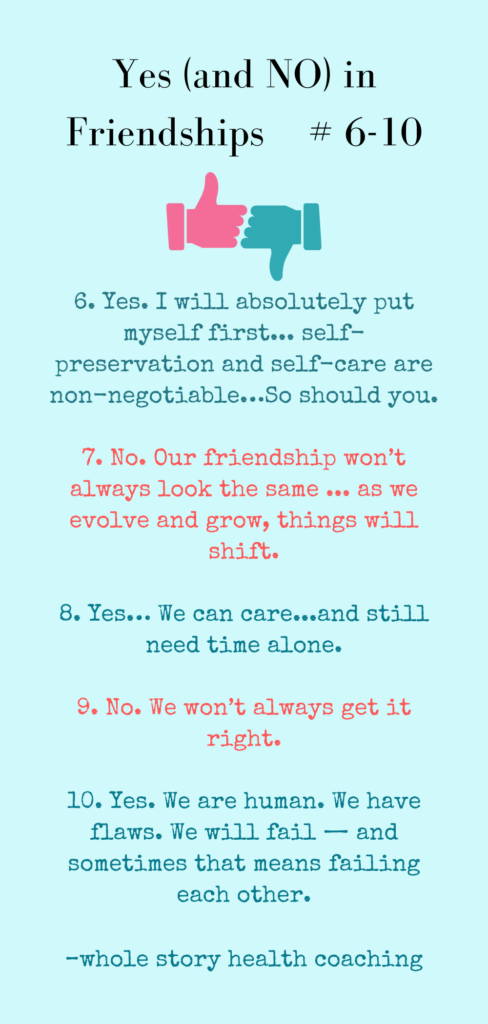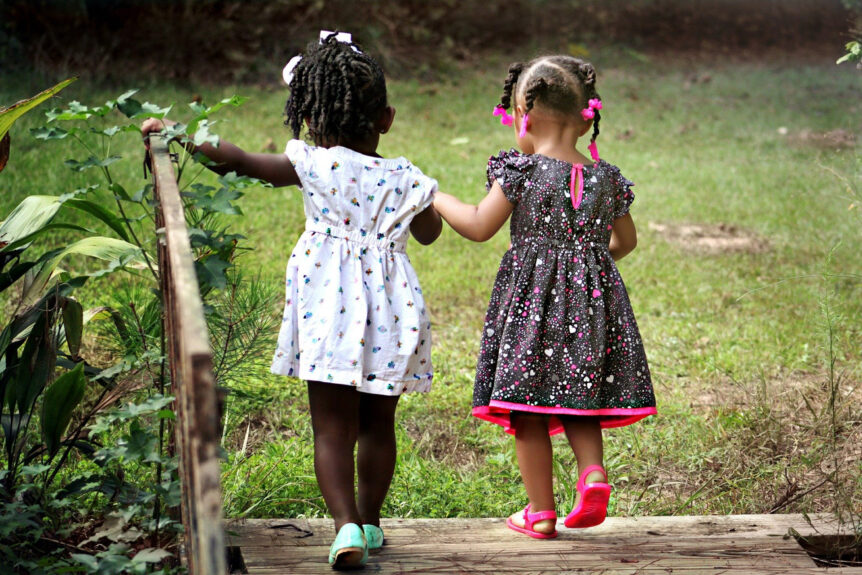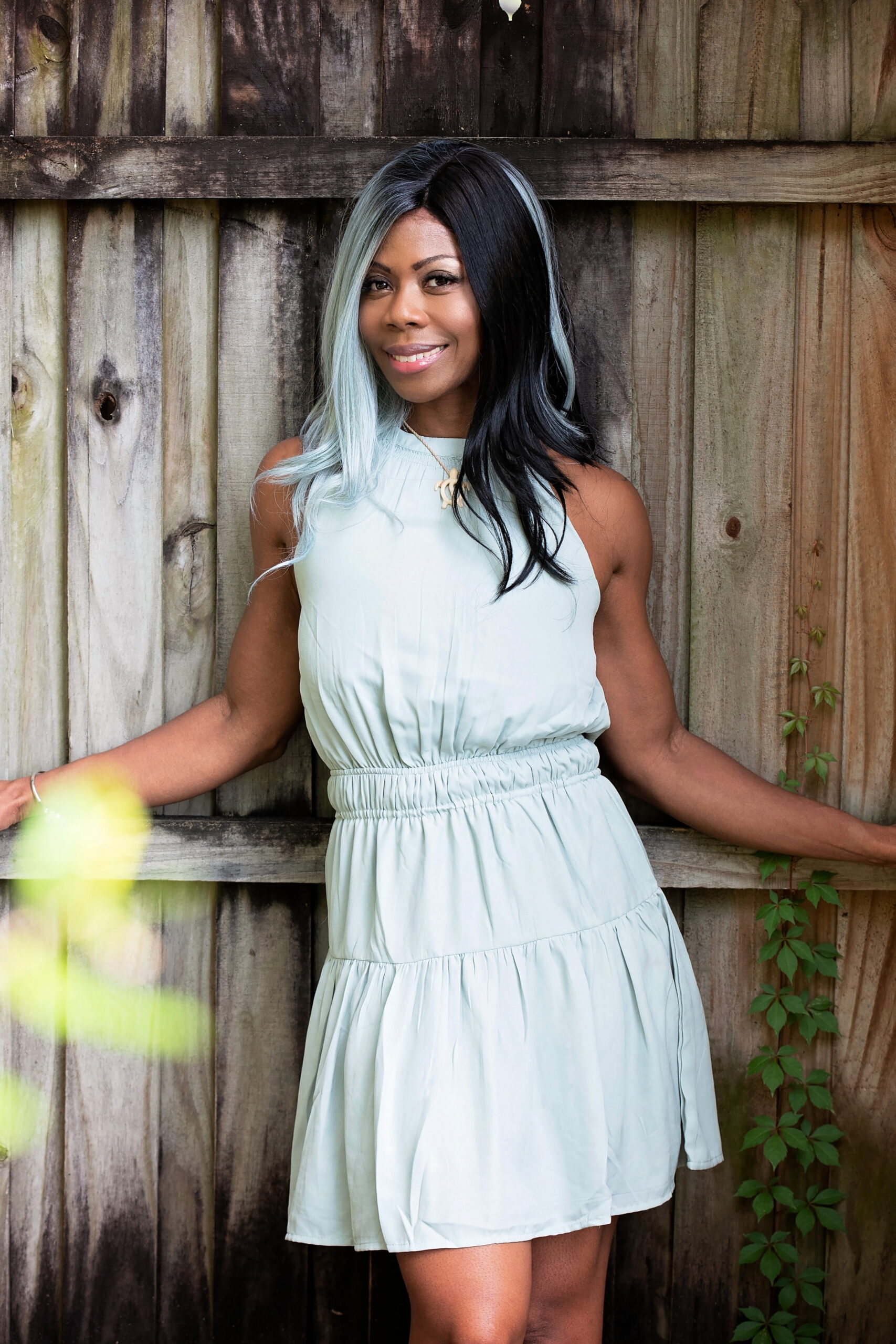Good friendships are a gift. I truly appreciate the safety, love, and belonging that comes along with them. We get to be ourselves, without having to wear a mask.
These are the people that see us, know us, love us, and accept us for who we are. But, despite all the benefits, even the closest friends need to develop a level of understanding, and set certain parameters, to maintain a happy, lasting love between friends.

- No. We don’t owe each other an explanation for our boundaries.
While it is important to communicate that we have established boundaries, we are under no obligation to dissect them for approval.
This can be hard for people to accept because sometimes our boundaries can cause others to feel hurt or rejected.
In addition to healthy communication when establishing our boundaries, we, and our friends, must understand that we have a right to our mental and emotional space.
- Yes. It is absolutely OK to not always be available.
After allowing myself to continuously overcommit and come close to burnout, I finally realized the need to be ruthless with my time. I learned of the concept in a business productivity book I was reading. Initially, I was horrified. It seemed cold and mean.
However, I had to realize that sometimes, especially in order to lay the foundation for a successful business (and my mental health), I would have to do just that. It was painful for me when I finally understood that text messages and social media banter had become a distraction — that I needed to step away from.
Becoming ruthless with my time wasn’t about not caring about my friends. It was about prioritizing. Whether we are growing our business, growing in our personal development, or just need a breather, there will be times when we simply will not be available. And that’s OK.
- No. We are not responsible for each other’s choices or outcomes. We can listen, sometimes, but we cannot fix the other…ever.
I love helping people, but my helping wasn’t very helpful. Instead, I was draining myself and preventing my friends from finding their own solutions. As a reformed people pleaser, this one was extra hard for me…probably harder for me than it was for them.
Additionally, the more they ignored my advice, the more strained the relationship became. There were no winners.
Ironically, I only fully grasped this lesson by being on the receiving end of advice that I was in no condition to follow. Understanding that we are not responsible for the other’s outcome gives both friends room to grow.
- Yes. We can have a life outside of each other.
I learned this one from a friend. In all honesty, it was a lesson that I hated learning. There was a time when I could not understand that people had a life and responsibilities outside of me. But, with more demands for my own attention, I found myself reflecting on this valuable lesson. Although I wanted to be there for my friends, (or wanted them to be ever present for me), it was important that everyone understood that our lives don’t just stop for friendships. There will be times when we just can’t show up.
- No. I won’t use my limited mental capacity right now…and I won’t ask that of you.
The need for this type of “NO” became more obvious with the amount of people that needed help or advice. Having gone through several periods in my life when I required being rescued, I felt that by taking care of others, I was paying it forward. That mindset was destructive and resulted in feelings of bitterness and resentment. Draining our own power supply will never fill the needs that others have.
- Yes. I will absolutely put myself first… self-preservation and self-care are non-negotiable…So should you.
This is an area that confuses many. It needs to be understood that we cannot pour from an empty cup. If we exhaust ourselves physically, mentally, emotionally, and physically, we will have nothing left to give anyone else. Self-preservation is essential and non-negotiable. It is a result of a well thought out and executed self-care routine. We cannot effectively show up for anyone else, if we cannot effectively show up for ourselves.
- No. Our friendship won’t always look the same … as we evolve and grow, things will shift.
As someone who loves personal development (as a matter of fact, I wrote a book about it), I am always looking for ways in which to grow. I am a firm believer that when we are not growing, we are stagnating. Unfortunately, growth during the course of a friendship can put a strain on it. This is especially true when friends grow in different directions…thus growing apart. As we mature and develop new interests, or rekindle old ones, things will shift. That’s natural. It doesn’t mean that our friends aren’t as important. Staying in contact, even if inconsistent for the time being, will help to maintain the bonds that were formed. The keys are flexibility and understanding.
- Yes…We can care… and still need time alone.
Life is not always smooth sailing. There will be times when we are doing our best just to keep our heads above water — times when we’re flailing. We simply won’t be able to show up as everyone’s cheerleader and number fan. It doesn’t mean that we don’t care. We need to understand that and so do our friends. In those circumstances, it’s important to remember that every individual has their own way of handling things. Some of us, like myself, go inward. Others, like some of my friends, seek comfort outwardly. In either case, we need to remember that we each have different needs and different ways of meeting them…and caring.
- No. We won’t always get it right.
My friends, Tracey, Corey and Monica have seen me totally unhinged and completely pulled together. No matter what, they accept me as I am, and I accept them. Do we always agree? No. Are we always there at the exact right time for each other? No. Do we always get it right, with regard to our friendship? No. But, that is something that we understand and are able to integrate into our love for each other. There are times when we will be disappointed, hurt and at odds with our friends. True friendships will take all of those things into account. It will never be about keeping score… but it will always be about love. No person can get everything right at all times and that’s OK.
- Yes. We are human. We have flaws. We will fail — and sometimes that means failing each other.
I remember the first time a friend said something similar to this, to me. I couldn’t understand how someone could tell me they would fail me and expect me to understand that. It wasn’t until my own failures as a friend that I understood the concept. As humans, we are imperfect, flawed and vulnerable to life’s circumstances. There will be days that are mentally and emotionally horrendous for us. And, our reaction to life will be about survival. We will become selfish, preoccupied and utterly consumed with ourselves. We will require leeway, understanding and compassion.

There will also be times when we have to give leeway, understanding, and compassion — times when we will come face-to face with the fact that no one is perfect.


